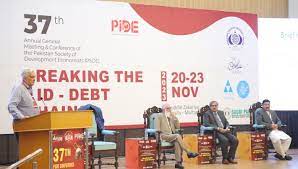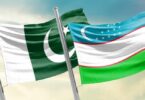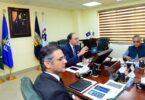F.P. Report
PESHAWAR: The 37th AGM and Conference of the Pakistan Society of Development Economists (PSDE), hosted by the Pakistan Institute of Development Economics (PIDE), in collaboration with Bahauddin Zakariya University, Multan, began at the Jinnah Auditorium of the BZU.
In the inaugural session of the Conference, Dr Nadeem Ul Haque, Vice-Chancellor of PIDE and President of the PSDE emphasized the significant contributions of Mahbub ul Haq to PIDE. He also highlighted PIDE & PSDE’s role in asking pertinent questions and engaging in impactful research exploring the country’s wide-ranging socio-economic issues, said in a press release issued here on Tuesday.
Dr. Nadeem stressed the need for a paradigm shift in thinking and the importance of asking critical questions. He said that the economic system in Pakistan is a “life support system.” Dr. Nadeem said that there is an immediate need to explore challenges such as exchange rates, unemployment, and the aid-debt trap.
In the secretary’s report, Dr Iftikhar Ahmad, Secretary of the PSDE, reiterated PIDE’s desire to initiate and collaborate on further research with researchers in South Punjab.
The first panel discussion of the Conference was on “Foreign Aid: Boon or Bane?” The discussion was moderated by Shahid Mahmood, Research Fellow at PIDE, Asad Hayauddin, Former Secretary of the Economic Affairs Division, Tobias Haque, Lead Country Economist for Pakistan at World Bank, and Naveed Aziz, Senior Governance Advisor to the FCDO.
The moderator said that since 1950, Pakistan has received over USD 200 billion in foreign aid. A significant chunk of the foreign aid has been in the form of loans. Also, a large amount of aid has been “tied aid.”
Asad Hayauddin remarked that the Pakistani government continues to lack direction. Consequently, we turn to the donors to help set our development direction. Pakistan’s strategy for long has been external resource mobilization for short-term gains.
Tobias Haque said that there are numerous examples where countries came to the donors with a homegrown development plan and sought development agencies’ financial and technical assistance.
Naveed Aziz said that aid utilization has not necessarily been entirely negative in Pakistan, and aid dependence in some areas has come down as well.
All panelists agreed that Pakistan needs to develop a long-term development plan with a clear indication of what support it requires from external sources and to what extent. Pakistan’s debt utilization stands as a major issue that has to be immediately improved. Pakistan needs to realize that aid is not the solution to problems, instead, it is just a tool to facilitate the implementation of development plans and achieving the set goals.







